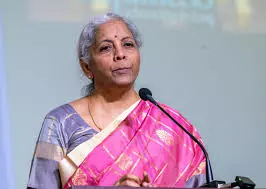By Raju Mansukhani
Ambassador Radhakrishnan successfully broke the ice with Marshal JV Stalin. There are ‘top secret’ telegrams detailing their talks of 1950 and 1952 in Moscow, now archived in India and overseas. Homage to the philosopher-statesman on his birth anniversary, commemorated as Teachers’ Day.
It was September 1946 when Pt Jawaharlal Nehru, on joining the Interim Government, publicly made clear that India’s foreign policy would be independent and driven by its own national interests. Nehru’s statements were keenly followed in the global media and reported over the next few years as non-Alignment evolved into a policy of independent judgement of world affairs.
In commemorating Dr S Radhakrishnan’s birth anniversary, as Teachers’ Day every year on September 5th, we unfold a relatively lesser-known facet of India’s President: a philosopher-statesman who played a stellar role in helping Prime Minister Nehru build the non-alignment movement, brick by brick. He was instrumental in verbalizing and communicating the policy to diverse global audiences when he assumed charge as Ambassador of India to the Soviet Union in 1949.
When Prime Minister Nehru was giving shape to non-alignment policy, the world was engulfed in the cold war. The United States followed an aggressive policy of stockpiling nuclear weapons, and their diplomatic posturing was calculative and astute. The Soviet Union, on the other hand, was suspicious of all nations and leaders who were not demonstrating solidarity with the USSR. Moreover, they denounced non-alignment as a policy of collaboration with British imperialism.
Pt Nehru, as his biographer S Gopal noted in Volume 2, “was in no mood to revise his policy. He was determined to develop, at whatever cost, a policy of independent judgement of each issue because that was ethically the right position.”
“Our general policy is to avoid entanglement in power politics and not to join any group of powers as against any other group,” wrote Prime Minister Nehru to Ambassador KPS Menon, who was assuming charge of the embassy in China, in early January 1947. “The two leading groups today are the Russian bloc and the Anglo-American bloc. We must be friendly to both and yet not join either. Both America and Russia are extraordinarily suspicious of each other as well as of other countries, this makes our path difficult, and we may well be suspected by each of leaning towards the other. This cannot be helped.”
Later speaking in the Constituent Assembly on 8 March 1948, Pt Nehru explained non-alignment not so much as a code of conduct but as a technique to be tested by results. “It was not a wise policy to put all our eggs in one basket…purely from the point of view of opportunism, if you like, a straightforward, honest policy, an independent policy is the best,” he said.

“I have little conceit left about my capacity to handle any difficult problem,” he wrote to VK Krishna Menon later in August, his confidante and friend, “Nevertheless it does surprise me how the Great Powers of the world behave to each other. Quite apart from the principles involved, there is an extraordinary crudity about their utterances and activities.”
During these critical years of 1939 to 1948, Dr S Radhakrishnan assumed charge as Vice Chancellor of Banaras Hindu University, compelled as he had been by the Mahamana Pt Madan Mohan Malaviya to provide leadership to a fast-burgeoning university. For a philosopher steeped in Western and Indian philosophies, Dr Radhakrishnan’s tenure witnessed establishment of a college of technology with focus on different facets of engineering; graduate and post-graduate courses on law and social sciences commenced, besides a college of ayurveda. Like the Mahamana, his faith in both modern sciences and ancient knowledge sources was steadfast.
Dr Radhakrishnan’s all-round contribution to BHU, his continuing commitment to the cause of freedom struggle and respect for Mahatma Gandhi were in evidence. In January 1942, for the silver jubilee celebrations of BHU, the Mahatma along with Dr CV Raman graced the university; their speeches and interactions being remembered till date for being a fount of inspiration for those dedicated to anti-colonial struggles.
From the academically oriented world of Banaras Hindu University, located in the ancient city of Kashi, where ghats and temples create a timeless ambience, in 1949, Dr S Radhakrishnan stepped onto the center-stage of global diplomacy. Prime Minister Nehru was convinced that Dr Radhakrishnan was a personality who could represent and define Indian values to the world.
In 1948-49 relations between the Government of India and Soviet Union had deteriorated. A major reason was, as S Gopal’s biography notes, the Soviet Union was directing the Indian Communist Party to rebellion and condemning Government of India policies.
Pt Nehru was forthright in his comments, “We want friendship and cooperation with Russia in many fields, but we are a sensitive people, and we react strongly to be cursed at and run down. The whole basis of Russian policy appears to be that no essential change has taken place in India, and we still continue to be camp followers of the British. That of course is complete nonsense and if a policy is based on nonsensical premises, it is apt to go wrong.”
Added to this crossfire was the inconsequential role which Mrs Vijayalakshmi Pandit played as Indian Ambassador in Moscow. She was not able to build contacts and had yet to find an audience with Marshal JV Stalin. It was rumoured, and later written about, that Stalin considered her arrogant and aristocratic. In this negatively-charged scenario Dr S Radhakrishnan moved to take charge in Moscow. Pt Nehru’s words of advice were to move cautiously, not go too far and to watch the reaction of the United States and Britain at every stage.
Dr Radhakrishnan successfully broke the ice with Marshal JV Stalin. There are ‘top secret’ telegrams, sent by the Indian Embassy, detailing their talks of 1950 and 1952. The 1950 telegram reported: “On 15th January 1950, the Ambassador interviewed Generalissimo Stalin at 9 pm at the Kremlin. The Ambassador began by expressing hope that good relations between two countries would be strengthened to which Stalin assented. Ambassador affirmed India’s anxiety to do everything possible to work for peace. India’s policy of neutrality was real and positive and, in Colombo, Pandit Nehru had reaffirmed India’s anxiety to avoid cold war tactics and anti-Communist pacts. Stalin said he did not hear about it, but seemed to approve.”
“Ambassador spoke of the essential need for big powers to do their utmost to put an end to the cold war and to place embargo on propaganda against each other, in which Generalissimo Stalin should take the lead in the larger interest of humanity. Stalin replied that did not depend upon him alone. The Ambassador replied that Stalin should take initiative and thus help suffering humanity.”
There was a pointed enquiry from Stalin about the Indian Government proposal to carry out agrarian reforms and, he added, something has to be done as peasants are in very poor condition. “The Ambassador assured that landlordism was being abolished and essential land reforms were being carried out. India had a hard time to solve all problems in these two years when she had to clear up feudal relics and effects of partition.”
Vijay Singh, retired professor of history from Delhi University who researched and translated key documents from the Russian State Archive of Social and Political History, underlined the significance of these ‘top secret’ reports. Through his writings and online portals, Vijay Singh also traced the turns and downturns of India’s diplomatic ties with the USSR.
The record of conversation of Ambassador Radhakrishnan’s interview with Generalissimo Stalin on April 5, 1952 details exchange of views as friendly and honest. “The Ambassador went on to say that his stay of two-and-a-half years in Moscow was most useful and he had every courtesy and assistance from the Foreign Minister and his Deputies. He recalled the prompt and ready assistance which the Foreign Office and the Soviet Government had rendered last year in the matter of the despatch of wheat to India.
When the Ambassador stressed that he was really grateful for the promptitude and readiness with which the Soviet Union had come to our aid in this, Stalin said: “There is nothing to be grateful about. We have only fulfilled our duty.” The Ambassador remarked that many States did not have a proper conception of their duty, nor did they discharge it, when they had.”
“The Ambassador referred to the various Soviet delegations that had recently visited India, and the Indian people got an idea of Soviet achievements. Referring to internal matters, Dr. Radhakrishnan said that the country (India) was indeed passing through critical times. We had got rid of various forms of exploitation. We had rid ourselves of foreign domination and we had got rid of the princely rule. We hoped to tackle the problem of our landlords equally successfully. “It would be good”, said Stalin, “if you succeed in doing it.”
On the political and economic situation in India, Ambassador Radhakrishnan said that India was as much against capitalist exploitation as Russia and it had the same economic objective. “But we wish to adopt peaceful parliamentary methods to achieve our aims, because our whole history has taught us that enduring progress should be of a peaceful character.”
To this the Generalissimo said: “But the exploiters will never quit-they will very seriously object to quit.” The Ambassador said that, in any case, we would try our own methods very hard, and if we succeeded it would be a great lesson to other nations.
Referring to our foreign policy, Dr. Radhakrishnan said that it was not unlike that of the Soviet Union in several matters – China, Japan, Korea or, for that matter, the admission of other nations to the UN. “We are not with America and we are not with any power”, he stressed, “We act according to our sense of right and do not yield to any political or economic pressure.”
The Ambassador asked whether Stalin would favour a neutral commission investigating the allegations of the use of bacteriological weapons in Korea. Stalin said that he had not given thought to this. As far as they were concerned, he said, “to us it has been proved that they (Americans) have attempted to try this out in Korea”, and said that a body of international lawyers had seen the evidence of this.”
As a tailpiece to the Korean War debate, according to United Nations estimates, civilian populations of both Republic of Korea and North Korea suffered massive social and economic dislocation; three million Koreans (soldiers and civilians on both sides) died in the war. American troops lost 40,000 soldiers in action, with over 100,000 wounded. The UN forces had casualties of over 100,000.
Dr S Radhakrishnan, on his return from Moscow in 1952, was elected as the first Vice-President of the Republic of India, an office he continued to occupy with dignity and grace till 1962.
Author is a researcher-writer on history and heritage issues; a former deputy curator of Pradhanmantri Sangrahalaya.
Disclaimer: Views expressed are personal and do not reflect the official position or policy of Financial Express Online. Reproducing this content without permission is prohibited.







